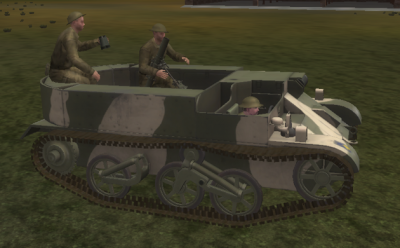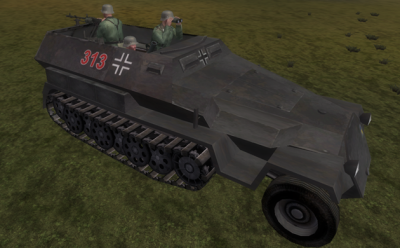Difference between revisions of "81mm(3inch) Mortar"
| Line 52: | Line 52: | ||
'''Updated 81mm Mortar Guide:''' https://drive.google.com/file/d/1NWtnF5Ab5mb-FgCLGLiiXzUzB2uBTd85/view?usp=sharing | '''Updated 81mm Mortar Guide:''' https://drive.google.com/file/d/1NWtnF5Ab5mb-FgCLGLiiXzUzB2uBTd85/view?usp=sharing | ||
=Game Play= | |||
[[Category:Field Pieces]] | [[Category:Field Pieces]] | ||
Revision as of 03:39, 26 November 2023

| |
| Universal Carrier 3 Inch Mortar | |
| Specifications | |
| Type | Mortar |
| Armament | 3inch Mortar Shell |
| Maximum Range | 2,500 m |
| Maximum Speed | 48 km/h |
| Crew | 3 |
| Weight | 3,345 kg |
| Tow Class | Medium |

| |
| SdKfz 251/2 Ausf. C 81mm Mortar | |
| Specifications | |
| Type | Mortar |
| Armament | 81mm Granatwerfer 34 Mortar |
| Maximum Range | 2,400 m |
| Maximum Speed | 58 km/h |
| Crew | 3 |
| Weight | 8,010 kg |
| Tow Class | Medium |
History
The origins of the Universal Carrier family can be traced back generally to the Carden Loyd Tankettes family, which was developed in the 1920s, and specifically the Mk VI Tankette.
In 1934, Vickers-Armstrongs produced, as a commercial venture, a light tracked vehicle that could be used either to carry a machine gun or to tow a light field gun. The VA.D50 had an armored box at the front for driver and a gunner and bench seating at the back for the gun crew.
The first WWII Online platform that is motorized with true indirect fire with ranges up to 2,500 meters. Each of these platforms has specific characteristics so learn their strengths and limitations.
Updated 81mm Mortar Guide: https://drive.google.com/file/d/1NWtnF5Ab5mb-FgCLGLiiXzUzB2uBTd85/view?usp=sharing